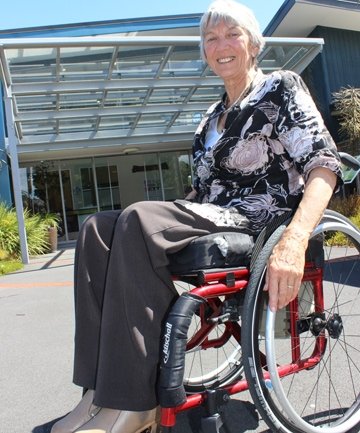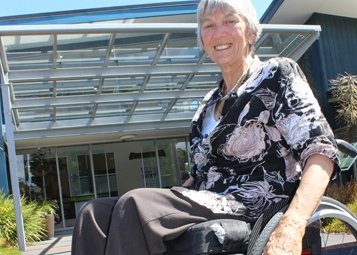New Zealand’s Access Alliance calls for a legislative pathway to a post-Covid recovery in which we can all participate
By David Porter, Grey Power Magazine
The Covid-19 pandemic is testing the world and New Zealand to an extent that perhaps only those with direct memories of World War Two or the Great Depression can fully fathom. The need to balance the health of our people has been at odds with the survival of our economy, and efforts to control the virus have often sidelined the human rights of those with access needs, including senior citizens.
As we move into what we hope will be a recovery phase, and look toward the 2020 general election, the Access Alliance is doubling down on the call for effective accessibility legislation.
The Access Alliance – of which Grey Power is a supporting organisation – is made up of 10 founding organisations from the disability sector, working with a range of supporting organisations, business champions, and nearly 7000 individual supporters, representing and advocating for people with access needs. Collectively the Alliance represents disabled people, seniors, carers of young children, the temporarily injured, migrants and people for whom English is a second language.
 Vivian Naylor, Barrier Free Advisor & Educator at CCS Disability Action, is a Grey Power member and Access Matters advocate.
Vivian Naylor, Barrier Free Advisor & Educator at CCS Disability Action, is a Grey Power member and Access Matters advocate.
“We must learn from what other disasters have taught us and make sure we get it right this time.”
“Right now we need to show politicians and everyday citizens why we need laws and systems that prioritise accessibility, to create the fair and inclusive society we all want to live in,” she said.
The Access Alliance is asking Grey Power members to add their voice to the call for accessibility legislation, to help convey this vital message to all politicians and candidates, so that no one is left behind.
“At a time like this, when there are so many people in need, it is all too easy to revert to the default positions and attitudes of ableism and ageism,” said Naylor.
“But we must learn from what other disasters have taught us and make sure we get it right this time.”
Access needs an afterthought
Naylor said that New Zealanders like to think they live in a fair society, but it was actually designed and built for just a portion of our population.
“People with access needs have been an afterthought, and this was made evident during the lockdown.”
Stories collected by the Access Alliance confirm that during an emergency the well-being of an individual – and their family and whānau – is significantly influenced by their situation before disaster struck. People who are already more vulnerable, such as seniors, people who are isolated, and those who can’t access information and resources, will suffer more in emergencies such as the pandemic.
People who rely on public transport or who have underlying health conditions, parents with young families, people with existing disabilities, underlying health conditions and care needs, and those in communities already experiencing health inequalities – for instance Māori and Pacific communities – will, and have been, disproportionately impacted by Covid-19 and the lockdown.
Disasters are a fact of life
Perhaps Covid-19 is a “once-in-a-100-year crisis”. But we have also recently experienced the Whakaari White Island eruption, the Al Noor Mosque and Linwood Islamic Centre shootings, the Christchurch and Kaikoura earthquakes, and the Nelson and Port Hill bushfires.
Realistically, disasters are a recurring fact of life. Unfortunately, during the pandemic response, many people were not able to access pertinent health and safety information. The release of such information, in accessible formats, was delayed by four weeks.
When the purchase of almost all goods and services moved to digital platforms, many people struggled to use often inadequate and inaccessible websites and mobile applications. This made everyday activities, like buying groceries and paying bills very difficult, if not impossible, for those with access needs. Confusion reigned over the use and availability of personal protective equipment (PPE) for essential care workers, or if they were even permitted to provide care at all.
Naylor noted that it was pleasing to see Prime Minister Jacinda Ardern’s emphasis on “building back better” to address run-down infrastructure. However, as has too often occurred in the past, she said, accessibility has not necessarily always been an integral part of that conversation – particularly from the outset of new projects – which has resulted in a persistent lack of access.
“There’s lots of talk about not squandering the lessons Covid-19 has taught us, and so we have to get this right,” she said. “Opportunities to ensure access for all were missed in the Christchurch rebuild and we don’t want to repeat those mistakes.”
Think through access from the outset
Accessibility needs to be thought through to match a diverse range of access needs, she added. “For example, while Auckland Council can be applauded for taking a pedestrian-friendly approach, resulting in more pedestrian-only areas, such initiatives can negatively impact older people. If the nearest parking or public transport route is a long walk away, a space that is otherwise a well-designed and age-friendly precinct is effectively out of reach. This is why consultation with communities is so critical at the beginning of project planning.”
“We really should be looking at our housing stock. Everyone is going to get old but so much of our housing is totally unsuitable for older people. Does that mean people are going to have to move houses? Or will they have to spend thousands of dollars to make their current home suitable?”
Naylor also said that during lockdown, when streets were safe and not filled with cars, trucks, fumes and pavements not cluttered with micro mobility transport devices, such as e-scooters, we saw generations of families safely enjoying the outdoors, cycling and walking. “I fear that when cars are back in vogue all that outdoor activity will be lost. Every generation can benefit from a more pedestrian-centered, cleaner environment.”
Universal design principles needed
Access Alliance is calling for legislation using principles of universal design to ensure that physical and digital environments can be accessed, understood and used to the greatest extent possible by all people. This approach recognises human diversity, and makes design provisions for real-life scenarios, such as pregnancy, childhood, injury, disability and old age.
“By designing for human diversity, we can create spaces, systems and technologies that are easier for all people to use,” said Naylor, adding: “If business is asking us to shop local, support local, let’s ask them to make it accessible so we can. If they don’t know how, let’s start the conversation.”
The private sector has already demonstrated an appetite for accessibility, according to consultations the Access Alliance conducted in early 2019. Business unanimously said that they would welcome accessibility legislation if it was coupled with education and support, so they had clarity and guidance on how to become accessible over time.
Business will likely be reliant on domestic consumers for some time, said Naylor. Customers with access needs, including seniors, will be reliant on digital services for longer than other Kiwis. Lockdown, and the restrictions of social distancing, have resulted in many businesses rushing to go online, without considering accessibility.
These businesses are not only excluding people who have access needs, but they are also missing out on the many other benefits of running an accessible enterprise. Businesses who rely on older New Zealanders as a significant source of their market share and income, have already felt the pain under lockdown.
It is perhaps older generations, more than any other, who understand that society must not merely accept altered circumstances in the wake of disaster, but should harness the opportunity to embrace the lessons of adversity and reimagine a better future.
Around one in four New Zealanders have a disability, so a quarter of our population are forced to deal with barriers to access on a daily basis. The effects of Covid-19 have made these accessibility gaps even more apparent.
We know that legislation is the way to create positive change. The visibility of New Zealand Sign Language (NZSL) Interpreters during times of national crisis, such as the COVID-19 pandemic, is required by law because of the NZSL Act 2006.
Accessibility legislation is the most strategic way to enable those with access needs to fully participate in our society. It is our pathway to a recovery in which we can all participate.
To find out more about the Access Alliance and the #AccessLawNow campaign go to www.accessalliance.org.nz
Published on behalf of Grey Power Magazine












